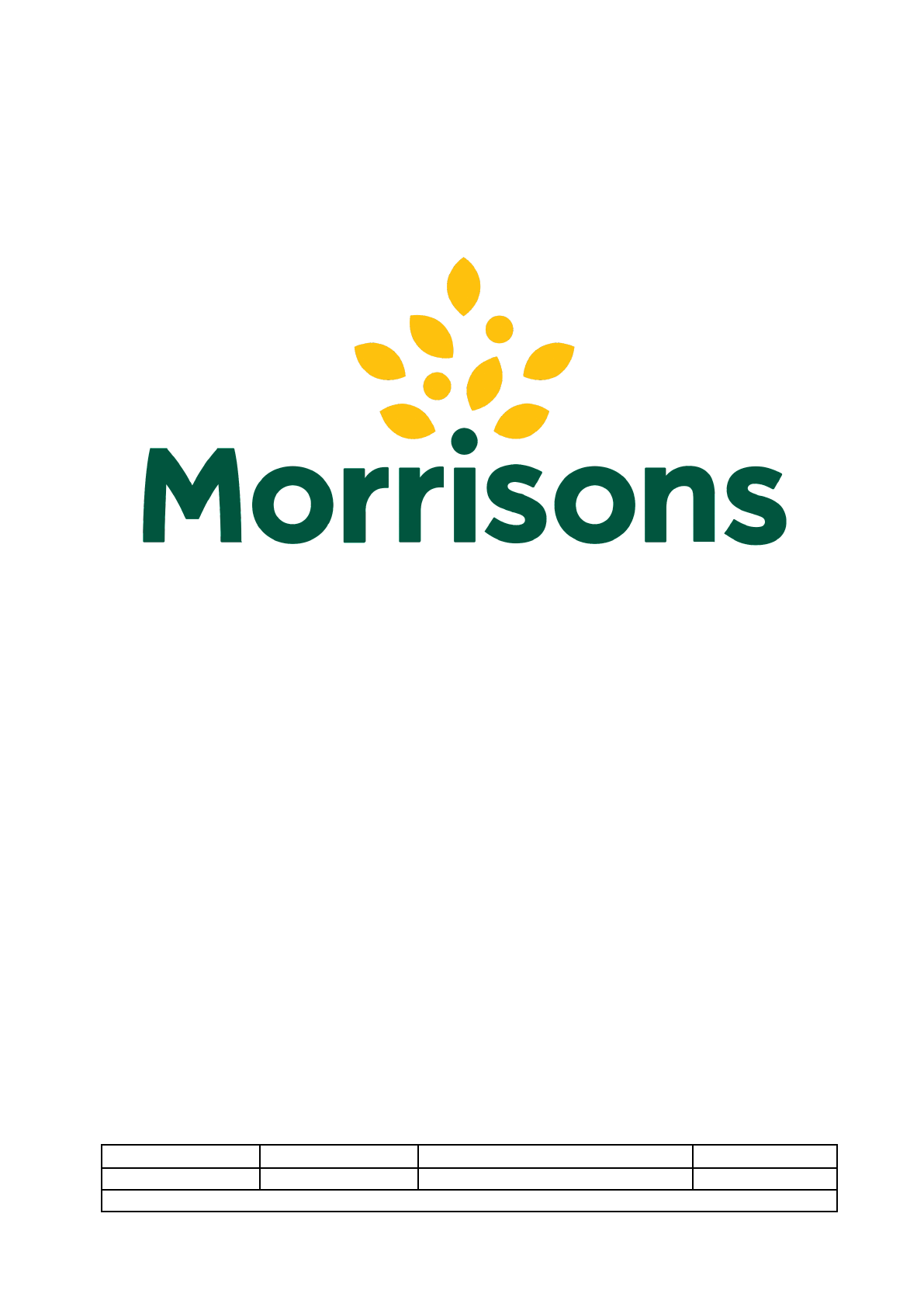
Child Labour Policy
Reference
Version number
Issued by
Date
CLR
1.1
Danny Miles & Felicity Bone
January 2022
Copyright Wm Morrison Supermarkets Ltd

Child Labour Policy
Morrisons is committed to preventing and addressing the use of child labour in our supply chains
and protecting the rights of young workers. Our Ethical Trading Code expressly prohibits the use
of child labour. It further states that:
● There shall be no new recruitment of child labour;
● Companies shall develop or participate in and contribute to policies and programmes
which provide for the transition of any child found to be performing child labour to
enable them to attend quality education until no longer a child; “child” and “child labour”
are defined in the appendix to this policy;
● Young persons under 18 shall not be employed at night or in hazardous conditions;
● Policies and procedures relating to Child Labour shall conform to the provisions of the
relevant International Labour Organisation (ILO) Standards.
We expect suppliers to undertake credible due diligence and monitor their operations to ensure
that their sites and supply chains are free from child labour and/or young people employed in
hazardous work.
If child labour is found at an own-brand manufacturing site supplying products to Morrisons, we
commit to engage with the supplier, the site and any appropriately qualified organisations to
develop a solution that prevents further harm and supports the long-term interests of the children
involved. Our preferred external support provider in addressing these issues is The Centre for
Child Rights and Business (The Centre).
Suppliers and manufacturing sites are expected to fully support all stages of the investigation
and remediation process, and cover any costs detailed in this policy or deemed necessary by
Morrisons and our external support provider.
Following a report or discovery of child labour, the supplier and Morrisons will agree a corrective
action and remediation plan with the site, which should include the following actions.
Immediate protection of children & young workers
Suppliers must:
● Ensure that children stop work immediately, are provided a clear explanation of immediate
next steps and are supported through the process by either a Social Compliance / Ethical
Trading representative or an appropriate member of the supplier’s Human Resources /
Personnel team;
● Undertake a full review of all site personnel records and create a list of all potential child
labourers and young workers;
● Ensure that all children identified have access to safe and adequate housing, are provided
with meals, and are adequately protected from harm until they can be reunited with their
family;
● Inform Morrisons Ethical Trading via email: [email protected]o.uk;
● If the issue is in China, Vietnam, Myanmar, Laos, Cambodia, Bangladesh or Turkey, contact
hours of discovery for guidance on how to proceed. The Centre will provide instructions on
next steps and a Notification Form to collect basic information of the case.

Morrisons Ethical Trading will:
● Inform the Ethical Trading Initiative (ETI) of the issue and share details of the affected
manufacturing site(s). We aim to work in collaboration with the ETI, their members and
other affected stakeholders in the delivery of any remediation;
● Inform relevant internal stakeholders including, but not limited to, Commercial, Supply
Chain, PR and Technical;
● Record all internal actions and communicate any additional requirements to the supplier.
Design & implementation of a remediation plan
In collaboration with Morrisons and our external support provider, suppliers must:
● Explain the restrictions on working ages to the children and assure them that, if they wish,
they can continue working after they reach the legal minimum working age.
● Take steps to understand what the children want and need in the short-term, and find out
what options exist for re-starting education.
● Develop a remediation plan that:
o Provides the opportunity for children to re-enter education and also protects their
economic wellbeing, where possible in consultation with a relevant non-governmental
organisation, and always in consultation with the child;
o Ensures the child receives compensatory remuneration on a monthly basis until they
reach working age, or until an alternative long-term solution has been agreed with the
child and their family (for example, the employment of an unemployed adult family
member in place of the child). Wages should be set at the national or regional legal
minimum and paid irrespective of whether the child is supporting family members, or if
the child is self-dependent;
o Ensures the child has access to appropriate training, apprenticeships or counselling
that may be required to support their ongoing wellbeing and development.
o Guarantees the child has acceptable and safe accommodation and living conditions;
o Documents all actions taken in support of remediation.
Ongoing actions and monitoring
In collaboration with Morrisons and our external support provider, suppliers must:
● Regularly check site personnel records and any remediation actions designed to prevent
new recruitment of child workers and enhance protection for young workers who remain in
employment.
● Regularly check and report back on the welfare of the child to ensure remediation plans are
being delivered effectively. This can be undertaken by a local third party organisation if
appropriate.
During this process, suppliers & sites must not:
● Remove, dismiss or conceal any of the suspected or confirmed child labourers and/or
young workers without prior notification to Morrisons;
● Threaten the children or their families, or interfere with any part of the assessment or
remediation;
● Conceal or falsify any documentation.
Such actions will be considered by Morrisons as evidence that the supplier and site are not
committed to effective child labour remediation, and are in breach of the Morrisons Ethical
Trading Code, as per section 17 of the Morrisons Standard Terms and Conditions.

Appendix: Definitions
Child: Any person less than 15 years of age unless local minimum age law stipulates a higher
age for work or mandatory schooling, in which case the higher age shall apply. If however, local
minimum age law is set at 14 years of age in accordance with developing country exceptions
under ILO Convention No. 138, the lower will apply.
Young Person: Any worker over the age of a child as defined above and under the age of 18.
Child Labour: Any work by a child younger than the age(s) specified in the above definitions,
which does not comply with the provisions of the relevant ILO standards, and any work that is
likely to be hazardous or to interfere with the child’s or young person’s education or to be
harmful to the child’s or young person’s health or physical, mental, spiritual, moral or social
development.
Hazardous Conditions: The following are examples of hazardous work according to the ILO:
● Work which exposes children to physical, psychological, or sexual abuse
● Work underground, underwater, at dangerous heights, or in confined spaces
● Work with dangerous machinery, equipment, and tools, or which involves the manual
handling or transport of heavy loads
● Work in an unhealthy environment which may, for example, expose children to hazardous
substances, agents, or processes, or to temperatures, noise levels, or vibrations,
damaging to their health
● Work under particularly difficult conditions such as work for long hours or during the
night or work where the child is unreasonably confined to the premises of the employer.
